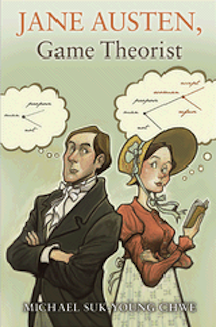By LaiYee Leong
It is a truth universally acknowledged that twenty-first-century students of quantitative social science have no need for nineteenth-century writers of novels of manners. How could fiction about young women in need of husbands inform the mathematical modeling of behavioral relations? Yet political scientist Michael Chwe has managed to find common ground.
Presenting an original view of Jane Austen, Chwe proclaims the writer a game theorist par excellence, a novelist who offers “insights not yet superseded by modern social science.” Chwe argues that, against a backdrop of elegant drawing rooms and picturesque country estates, it is the logic of strategic interactions that animate Austen’s narratives. Austen’s six novels illuminate the principles of game theory by examining individual calculations, actions, and outcomes.
Game theory explains behavior as the product of rational decision-making based on anticipation of what others might do. The approach distills human motivations into a matter of preferences and strategic thinking, and represents the choices people make as a series of interactions yielding information and payoffs. Although the basic concept is intuitive, game theory in application often involves complex mathematical frameworks. It has been criticized for seeing individuals as atomistic, self-serving, and overly calculative while disregarding human feelings and the social and cultural contexts that shape behavior. Game theorists typically use jargon of the sort that cause despair even among other social scientists. (The sort that prompted an English professor at Yale to declare “But they can’t write!” when I, an English major, told him of my interest in studying Political Science in graduate school.)
Himself a game theorist, Chwe argues that Austen’s work does not merely provide suitable material to illustrate game theory. Rather the novels constitute “an ambitious theoretical project” in which Austen purposefully explores multiple facets of strategic thinking. Austen, he claims, has written “game theory textbooks.” For Chwe, the essence of Austen’s heroines lies in their insistence on making independent choices while facing constraints and in their alertness to how others may respond. The development of major characters follows their increasing capacity to think and act strategically. Austen delves into the motivations and consequences of their choices much as any game theorist considers the assumptions and outcomes of social behavior.
Chwe starts with a beginner’s introduction to game theory that helpfully avoids jargon. He also outlines each novel, highlighting the strategic interactions to be thematically examined later. The core of the book uses close reading to support its argument. It is suggested that Austen makes two particular contributions to game theory. First, Austen’s characters cement their own relationships when they jointly make strategic decisions. It challenges the notion that calculative behavior is always selfish or atomistic. Second, Austen highlights the causes and effects of “cluelessness” or the willful avoidance of strategic thinking by people like Lady Catherine de Bourgh. It helps to explain why those in powerful positions encounter unexpected failure in situations where they should easily succeed.
This book’s effort to bridge two unlikely disciplines is agreeably creative. It convincingly demonstrates that Austen’s work is amenable to reflections on strategic thinking. After all, her female characters continue to engage readers because they evince a clear-eyed understanding of circumstances, even as they are constrained by sex and class. It is refreshing to see Austen through a new and unexpected framework.
At the same time, the book falls short whether one seeks to comprehend game theory or to gain new insight into Austen. Game theory often seems to be little more than strategic thinking defined as the ability to act only after one observes, listens, and imagines another person’s point of view. Such representation undersells game theory, which has much explanatory power as evident from its dominance in social science. As for those already familiar with Austen’s novels, Chwe satisfies the initial curiosity that the title provokes. But once its cleverness is duly noted, I find the lens of game theory mostly reframes the action and characters without advancing greater appreciation of Austen’s work. Readers already know that Elizabeth Bennet, Fanny Price, and Emma Woodhouse are intelligent women who possess subtlety of thought and sympathy for others. The insistent focus on their capacity for rational thought takes away from the less rational aspects of these characters–whether prejudice, timidity, or frivolity–that make them endearingly human.
Chwe stretches his idea thinnest when he claims to apply Austen’s game theory principles to other narratives and even present-day events. He calls out similarities between Austen’s heroines and characters in African-American folktales who outwit their social betters. While the analogy is interesting, it does not take the reader far. Chwe also suggests Austen has relevance for understanding tactics used by civil rights opponents and US military missteps in places like Iraq. In these instances, he claims the failure of those in power to think strategically is akin to the cluelessness that Austen highlights. But drawing a parallel between Lady Catherine on the one hand and racist politicians and military strategists on the other hand is contrived. It offers only the superficial conclusion that they share contempt for those they consider their inferiors.
At one point, Chwe discusses Austen’s aversion to characters that reduce what they see to mere numbers, rather than with genuine discernment. That is also a criticism frequently lobbed at game theorists. By seeking an ally in a canonical literary figure like Austen, Chwe wants to show that game theory can describe human relations at many levels. Chwe’s effort to make game theory accessible is largely successful, but at its most ambitious it tips over into over-simplicity. Highly original and readable, Jane Austen, Game Theorist is most compelling when it affirms Austen’s gift for timeless truths by demonstrating that her work stands up to a dissecting viewpoint as contemporary as game theory.
LaiYee Leong is a fellow at the John G. Tower Center for Political Studies at Southern Methodist University and a fellow at the SMU Center for Presidential History. Southern Methodist is home to the Gamma of Texas chapter of Phi Beta Kappa.




